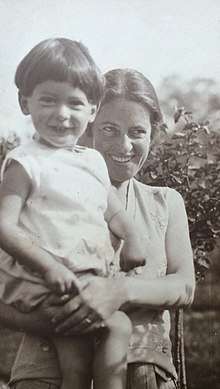C. A. Lejeune
Caroline Alice Lejeune (27 March 1897 – 31 March 1973) was a British writer, best known for serving as the film critic for The Observer from 1928 to 1960. She was among the earliest newspaper film critics and is thought to have been the first British woman in the profession, with her first regular film column predating Iris Barry's earliest contribution to The Spectator of this kind by about a year.

Family
C. A. Lejeune was born on 27 March 1897 in Didsbury, Manchester,[1] the youngest in a large family of 8 children[2] that eventually resided at 10 Wilmslow Road, Withington, Manchester. Her father, Adam Edward Lejeune, born in Frankfurt in 1845 of Huguenot ancestry, was a cotton merchant who had come to England after doing business in Frankfurt. He died at Zurich, Switzerland on October 28, 1899[3] when his daughter was two years old. Her mother, Jane Louisa, who was the daughter of the Nonconformist minister Dr Alexander Maclaren, was a friend of C. P. Scott and of Caroline Herford, who was Caroline's godmother and Headmistress of Lady Barn House School, where Caroline received her elementary education. She and four of her sisters (Franziska, Marion, Juliet and Hélène) received their secondary education at Withington Girls' School, of which their mother, Scott, and Caroline Herford were among the founders.[4]
After leaving school, unlike her sisters, she rejected her place at Oxford University and studied English Literature instead at the Victoria University of Manchester.[2]
Journalism and other writing
Partly through her mother's friendship with Scott, Caroline found work writing for The Manchester Guardian (now The Guardian), initially as a music critic. Her main interests were in Gilbert and Sullivan, Verdi, and Puccini. However, she was increasingly excited by the new medium of the cinema.
With her mother accompanying her,[5] she moved to London in 1921 and the next year she began writing a column for the paper called "The Week on the Screen".[6] In 1925[7] she married Edward Roffe Thompson, a psychologist and journalist. (Their home at Lane End was near her mother's home in Pinner.)[8] Their son, Anthony Lejeune, was born in 1928.[9] That same year she left The Manchester Guardian for The Observer (which then had no connection with the Guardian group), where she remained for the next 32 years, although she also contributed to other publications such as The New York Times contributing articles about British cinema to the American paper's Sunday drama section.[10]
She also wrote an early book on the subject of Cinema (1931), and her film reviews are anthologised in Chestnuts in her Lap (1947) and posthumously in The C. A. Lejeune Film Reader, edited by her son Anthony Lejeune (1991). In the postwar years she was also a television critic for a time, and she also adapted books for the medium, writing scripts for the BBC's Sherlock Holmes television series (1951), Clementina and The Three Hostages
C. A. Lejeune's film reviews have long been compared to those of Dilys Powell, whose criticism for The Sunday Times overlapped for about 21 years with Lejeune's commentary for The Observer.[11] Unlike Powell, Lejeune became increasingly disillusioned by various trends in films and, shortly after she had expressed her disgust at Michael Powell's film Peeping Tom, she resigned from The Observer following the release of Alfred Hitchcock's Psycho in 1960; she walked out of press screenings of both films.[5][12] Subsequently, she completed Angela Thirkell's unfinished last novel, Three Score Years and Ten (1961) and wrote an autobiography, Thank You for Having Me (1964).
Death
C. A. Lejeune died at the age of 76 on 31 March 1973.[13] She had been a resident of Pinner for more than forty years. Peter Sellers said of her that "her kindness, her complete integrity, and her qualities as an observer and a commentator have gained her the unqualified admiration of my profession. She respects integrity in others and has no harsh word for anyone whose honest efforts end in failure. Everything she has written, I am sure, has come as much from her heart as her head, and the high quality of her writing, and the standard of film-making she encourages, have made her work a part of cinema history."[14]
References
- The Dictionary of National Biography
- Lewis, Naomi (10 March 2019). "Thank You for Having Me by CA Lejeune – archive, 1 March 1964". The Observer. Retrieved 8 April 2019.
- The Guardian, 1 November 1899
- "The Founders of Withington Girls' School". Withington Girls' School. Archived from the original on 30 September 2011. Retrieved 22 August 2011.
- Hutchinson, Pamela (2 March 2015). "CA Lejeune: the pioneering female film critic who changed our view of cinema". The Guardian. Retrieved 7 April 2019.
- Hutchinson, Pamela. "A pantheon of one's own: 25 female film critics worth celebrating: 15. CA Lejeune". Sight & Sound/BFI Film Forever. Retrieved 8 April 2019.
- Caroline A Lejeune England and Wales Marriage Registration Index, 1837-2005. Family Search. Retrieved 20 April 2018. (subscription required)
- Lejeune, C. A. (1971) Thank You for Having Me. London: Tom Stacey; p. 114 & 178
- "Anthony Lejeune". The Times. 6 March 2018. Retrieved 7 April 2019. (subscription required)
- "C. A. Lejeune Dies; British Film Critic". The New York Times. Associated Press. 2 April 1973. Retrieved 7 April 2019.
- Davies, Rebecca (25 July 2008). "Women on film". Prospect. Retrieved 8 April 2019.
- Patterson, John (13 November 2010). "Peeping Tom may have been nasty but it didn't deserve critics' cold shoulder". The Guardian. Retrieved 7 April 2019.
- The Observer, 8 April 1973
- The Times Obituary, 2 April 1973
- Lejeune, C. A. (1964) Thank You for Having Me. London: Hutchinson (autobiography)
External links
- C.A. Lejeune at the BFI's Screenonline
- Caroline Lejeune at Women Film Pioneers Project